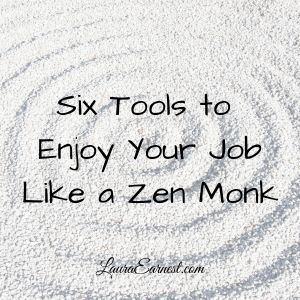One of my friends is currently sharing her living space with a Zen Buddhist nun. Sarah is very deliberate in her actions and words and exudes a cloud of serenity. I feel calmer and more deliberate just being in her presence.
A few years ago I read an article, Six Tools To Enjoy Your Job Like a Zen Monk. I review the article when I feel stressed at work and have found that applying the principles might not give me actual enjoyment, but will at least lower the stress level. Here is how I apply them:
- Stay aware of yourself and your surroundings. If I am in a meeting daydreaming about something else, or (even worse) multitasking on email or a programming task, I will inevitably find myself either volunteered for something, or unable to answer questions because I haven’t been following the discussion. This never pays off. I usually end up answering the wrong question in the emails because I am not paying attention there, either. And if I am programming, I will inevitably make mistakes that I will have to correct later. I make a specific effort to focus on what I am doing and keep my hands off my keyboard during meetings.
- Work at a Comfortable Pace. My clients want everything done yesterday, without specifications, and for free. I have accepted this as a reality. I filter everything they tell me and ask, “Is this really stopping them from doing business?” Chances are, the request is not that serious, so it can be prioritized and worked on in order. I have learned that if I treat things like emergencies when they are not, I make mistakes and my stress levels skyrocket. Working at a comfortable pace ensures that I will focus properly and wrap up all the loose ends.
- Take a Few Moments to Transition to a New Task. For me this means that I sit and think about what I have just done, making notes as necessary to be able to pick it up again later; it also means that I sit and think about what I need to do next. Both of these prevent me from hurrying into the next task without having a plan of action.
- Do What is Necessary First. Yes, I want to read the latest technology blog, but I need to do that when I have empty time. By putting the most important task first, I am able to clear out large swaths of tasks quickly, and maintain my productivity levels.
- Develop Routines. There are certain things I must do, such as filing timesheets and writing status reports. By having these on a checklist, I am able to make sure I don’t forget to do these administrative tasks that are important to my client.
- Forget the Work Day and Enjoy Your Relaxation Time. This is the one biggest thing I love about being a consultant. I get to leave work at work. But I need to also apply this during my lunch break. I find that if I completely get away from the computer during lunch, I am much more productive in the afternoon, and happier at my work.
My current client is very enjoyable, but this will not last forever. It is important to practice these suggestions so that when I need to apply them, they are already habitual.






